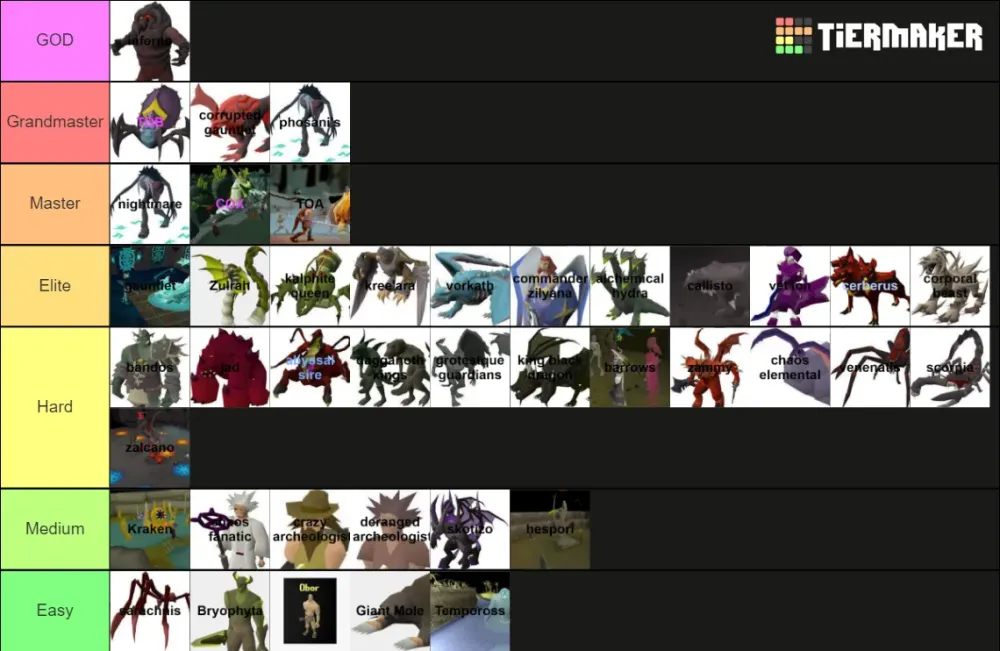Your cart is empty
How Many Bosses Are There in Old School RuneScape (OSRS)?

Warning: Undefined variable $post in /home/osrsmoneymaking.guide/public_html/wp-content/themes/kadence/functions.php on line 391
Warning: Attempt to read property "ID" on null in /home/osrsmoneymaking.guide/public_html/wp-content/themes/kadence/functions.php on line 391
Bossing in Old School RuneScape (OSRS) is a popular and engaging aspect of the game, attracting players who seek challenging combat and rewarding loot. Bosses serve as formidable opponents that test players’ skills, strategies, and teamwork. With a variety of bosses available, each with unique mechanics, players can experience a thrilling adventure while aiming for powerful items and achievements. Understanding the intricacies of bossing enhances the gameplay experience, making it essential for both novice and experienced players.
Boss mechanics in OSRS are diverse and can significantly influence the outcome of encounters. Each boss has specific attack patterns, abilities, and phases that players must learn to overcome. For example, some bosses utilize area-of-effect attacks, requiring players to position themselves strategically to minimize damage. Others may summon minions or create environmental hazards, adding complexity to the fight.
Additionally, many bosses have unique mechanics that require players to adapt their strategies. For instance, the Kraken has a mechanic where players must avoid its tentacle attacks while dealing damage to its weak points. Similarly, the Vorkath boss has multiple phases, each introducing new attacks and challenges, such as fire breath and spawning undead minions. Understanding these mechanics is crucial for maximizing efficiency and survivability during encounters.
Teamwork is often essential in tackling more challenging bosses. Coordinating with fellow players can lead to more effective strategies, such as assigning roles for healing, damage dealing, and tanking. Communication is key, allowing teams to react swiftly to changing mechanics in boss fights.
Furthermore, players can enhance their chances of success by utilizing specific gear and inventory setups tailored for each boss. This includes selecting appropriate weapons, armor, and potions that can bolster damage output or increase defensive capabilities. Learning the strengths and weaknesses of each boss, as well as the most effective tactics to counter their abilities, can significantly improve a player’s performance in boss encounters.
In summary, understanding boss mechanics in OSRS is vital for players looking to succeed in challenging battles. Mastering the intricacies of each boss, adapting strategies, and working effectively within a team can lead to rewarding experiences and valuable loot.
Types of Bosses in OSRS

In Old School RuneScape (OSRS), bosses play a pivotal role in the game’s PvE (Player vs Environment) content. They are challenging enemies that provide players with unique loot, experience, and an adrenaline rush. Bosses can be categorized into several types based on their mechanics, locations, and rewards.
Here are the primary types of bosses you will encounter:
- Raid Bosses: These are some of the toughest challenges in the game and require a group of players to defeat. Examples include the Chambers of Xeric and Theatre of Blood. Cooperation and strategy are key here!
- Unique Location Bosses: Found in specific locations, these bosses often have unique mechanics that players must learn to conquer. A prime example is Vorkath, a powerful dragon that requires tactical skill to defeat.
- Wilderness Bosses: These bosses are located in the Wilderness and often attract player killers (PKers) looking to take advantage of unsuspecting adventurers. Scorpia and The Chaos Elemental are popular examples.
- Quest Bosses: Some bosses are tied to quests and serve as the final challenge in a storyline. For instance, defeating Kraken is essential for completing a specific quest.
- Mini-bosses: These are less powerful than main bosses but still provide a good challenge. They often serve as a stepping stone to more formidable opponents. An example is the Abysmal Sire.
Understanding these types can greatly enhance your gameplay experience, as each offers different challenges and rewards.
List of Major Bosses in OSRS

Old School RuneScape boasts a robust roster of bosses, each offering unique challenges and lucrative rewards. Here’s a breakdown of some of the major bosses you can face:
| Boss Name | Location | Notable Drops |
|---|---|---|
| Zulrah | Snake Island | Serpentine Visage, Zul-andra Teleport, Tanzanite Mutagen |
| Vorkath | Ungael | Draconic Visage, Vorkath’s Head, various Dragon items |
| Kraken | Kraken Cove | Kraken Tentacle, Magic Fang, Pet Kraken |
| Scorpia | Wilderness | Scorpion‘s Kiss, Pet Scorpia, various herbs |
| General Graardor | Bandos’s Stronghold | Bandos Tassets, Bandos Chestplate, Pet Graardor |
| Telos | The Heart of Gielinor | Telos’s Essence, various rare items |
These bosses not only provide great loot but also test your skills and understanding of the game mechanics. Each encounter is unique, so be prepared for different strategies depending on the boss you face!
How Bosses Impact Gameplay
In Old School RuneScape (OSRS), bosses play a pivotal role in shaping the overall gaming experience. They serve as significant milestones for players, offering both challenges and rewards. Here’s how they impact gameplay:
- Challenge and Skill Development: Bosses are designed to test your combat skills, strategy, and teamwork. Players often need to learn mechanics, timing, and positioning to succeed against tougher foes.
- Community Engagement: Many bosses require teamwork, leading players to form groups or clans. This fosters a sense of community as players strategize, share tips, and celebrate victories together.
- Loot and Rewards: Defeating a boss can yield valuable loot, from rare items to unique gear. This motivates players to take on these formidable challenges in hopes of reaping the rewards.
- Game Progression: Many quests and achievements are tied to defeating specific bosses. This creates a natural progression in the game, encouraging players to improve their skills and gear.
- Economy Influence: Boss drops can significantly impact the in-game economy. Rare items can lead to price fluctuations, shaping how players trade and interact.
In summary, bosses in OSRS are not just formidable opponents; they influence player development, community dynamics, and the game’s economy, making them a vital aspect of the OSRS experience.
Strategies for Defeating Bosses
Defeating bosses in Old School RuneScape requires a mix of preparation, strategy, and sometimes, a little luck. Here are some tried-and-true strategies to help you conquer these formidable foes:
- Know Your Boss: Research the boss you’re facing. Understand their mechanics, attack patterns, and weaknesses. Websites, forums, and YouTube guides can be invaluable resources.
- Gear Up: Equip the best gear available for your combat style. Make sure to consider defensive and offensive options, and bring potions and food to sustain your health during the fight.
- Teamwork is Key: Many bosses are designed for group encounters. Assemble a team with complementary skills—like tanks, damage dealers, and healers—to increase your chances of success.
- Practice Makes Perfect: Don’t be discouraged if you fail the first few times. Learn from your mistakes, and refine your approach each time you try.
- Use Prayer Wisely: Managing your Prayer points is crucial. Use prayers that enhance your defense or increase your damage output, but be mindful of your point consumption.
By employing these strategies, players can enhance their chances of defeating bosses in OSRS and enjoy the thrill of victory, along with the valuable rewards that come with it.
7. Rewards from Bossing
Bossing in Old School RuneScape (OSRS) is not just about the thrill of the fight; it also offers a treasure trove of rewards that can significantly enhance your gameplay. Let’s break down some of the most sought-after rewards you can earn from various bosses.
- Rare Loot: Many bosses drop unique items that are highly valuable in the game. For instance, the Party Hat and Scythe of Vitur are coveted among players.
- Unique Gear: Defeating certain bosses can reward you with powerful gear. For example, the Zamorak Godsword from the Zamorak boss is a popular choice for combat efficiency.
- Crafting Materials: Bosses often drop materials that can be used to craft potions, armor, or other useful items. For instance, Dragon bones can be used for Prayer training and are always in demand.
- Currency: Some bosses drop valuable coins or items that can be sold for a high price in the Grand Exchange, allowing you to accumulate wealth quickly.
Additionally, participating in bossing can improve your skills and provide you with experience points, which can be vital for leveling up. It’s also worth noting that some bosses drop unique pets, which are not only adorable but can also serve as status symbols among players.
8. Tips for New Players
Jumping into the world of bossing in OSRS can be both exciting and daunting, especially for new players. Here are some tips to get you started on the right foot:
- Start Small: Begin with easier bosses like Giant Mole or King Black Dragon. They help you understand mechanics without overwhelming you.
- Gear Up: Ensure you have appropriate gear for your combat style. Rune armor or Dragon weapons are excellent choices for beginners.
- Join a Team: Bossing can be easier and more enjoyable with friends or a clan. They can provide support and share valuable strategies.
- Learn Mechanics: Take the time to research each boss’s mechanics and attack patterns. This knowledge will help you avoid unnecessary deaths.
- Bring Supplies: Stock up on food, potions, and other supplies before heading into a boss fight. Items like Sharks or Prayer potions can be lifesavers.
Lastly, don’t be discouraged by losses. Every boss fight is a learning experience. With practice, you’ll become more skilled and start reaping the rewards of your efforts!
How Many Bosses Are There in Old School RuneScape (OSRS)?
Old School RuneScape (OSRS) is renowned for its vast array of bosses, each presenting unique challenges and rewards. As of October 2023, there are numerous bosses scattered throughout the game, catering to various combat levels and player preferences. Bossing is a significant aspect of OSRS, attracting players who seek both the thrill of combat and the potential for lucrative loot.
Here’s a breakdown of the types of bosses in OSRS:
- Regular Bosses: These are the most common bosses that players encounter and include:
- Giant Mole
- King Black Dragon
- Venenatis
- Serbuleon
- Barrows Brothers
- Raid Bosses: More challenging and often requiring a group to defeat:
- Theatre of Blood Bosses (e.g., Verzik Vitur)
- Chambers of Xeric Bosses (e.g., Olm)
- Seasonal and Event Bosses: These bosses appear during specific events:
- Halloween and Christmas Event Bosses
- Limited-time bosses during special in-game events
In total, there are approximately 40 unique bosses in OSRS, not counting the various forms and phases many of them can take. Each boss has its own mechanics, weaknesses, and strategies for defeat, making bossing an engaging activity for both new and veteran players.
Conclusion: The Importance of Bossing in OSRS
Bossing in OSRS is not just about the thrill of combat; it plays a crucial role in the game’s economy and community, providing players with opportunities for teamwork, skill development, and the pursuit of rare loot.
Warning: Undefined variable $post in /home/osrsmoneymaking.guide/public_html/wp-content/themes/kadence/functions.php on line 391
Warning: Attempt to read property "ID" on null in /home/osrsmoneymaking.guide/public_html/wp-content/themes/kadence/functions.php on line 391

